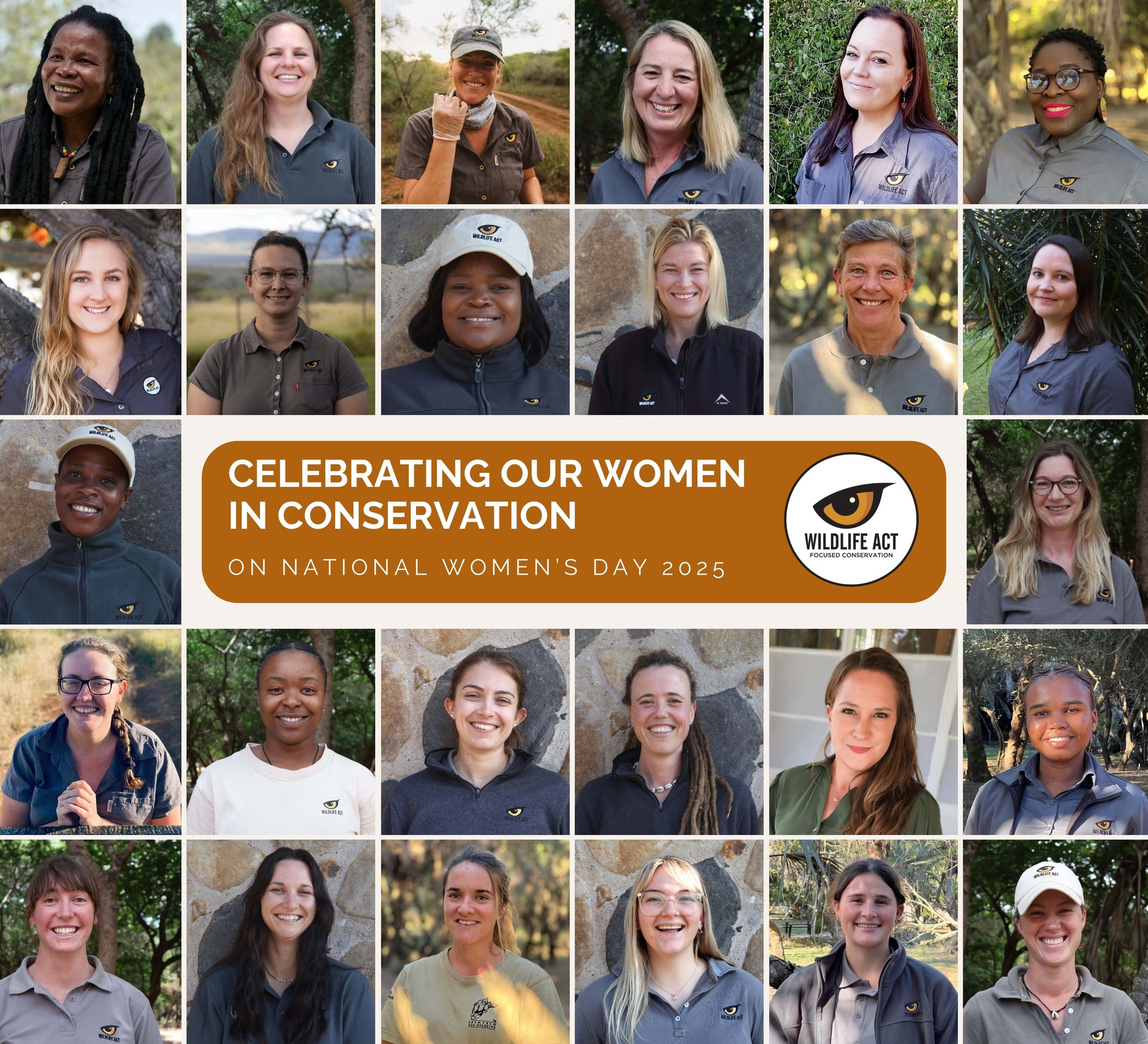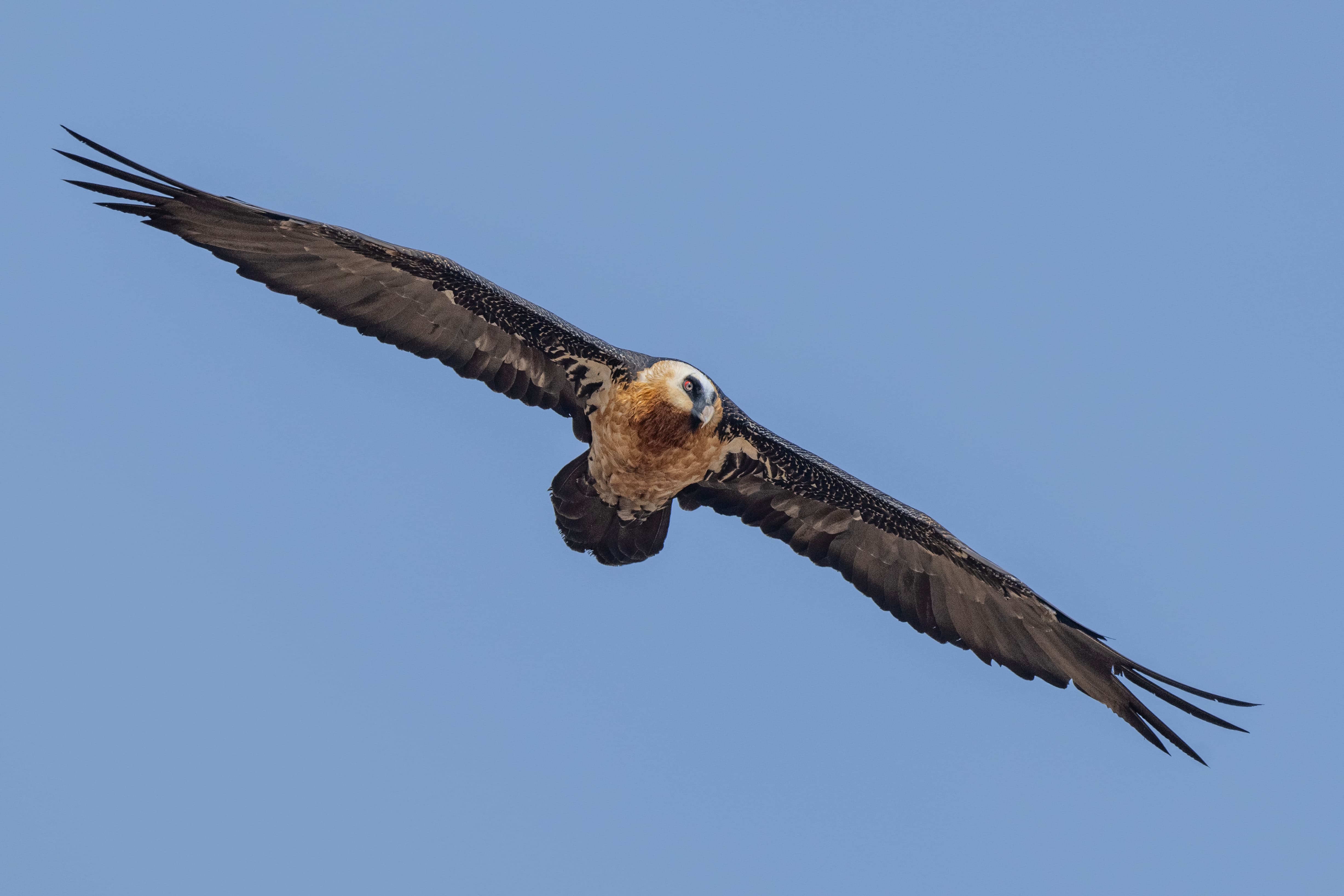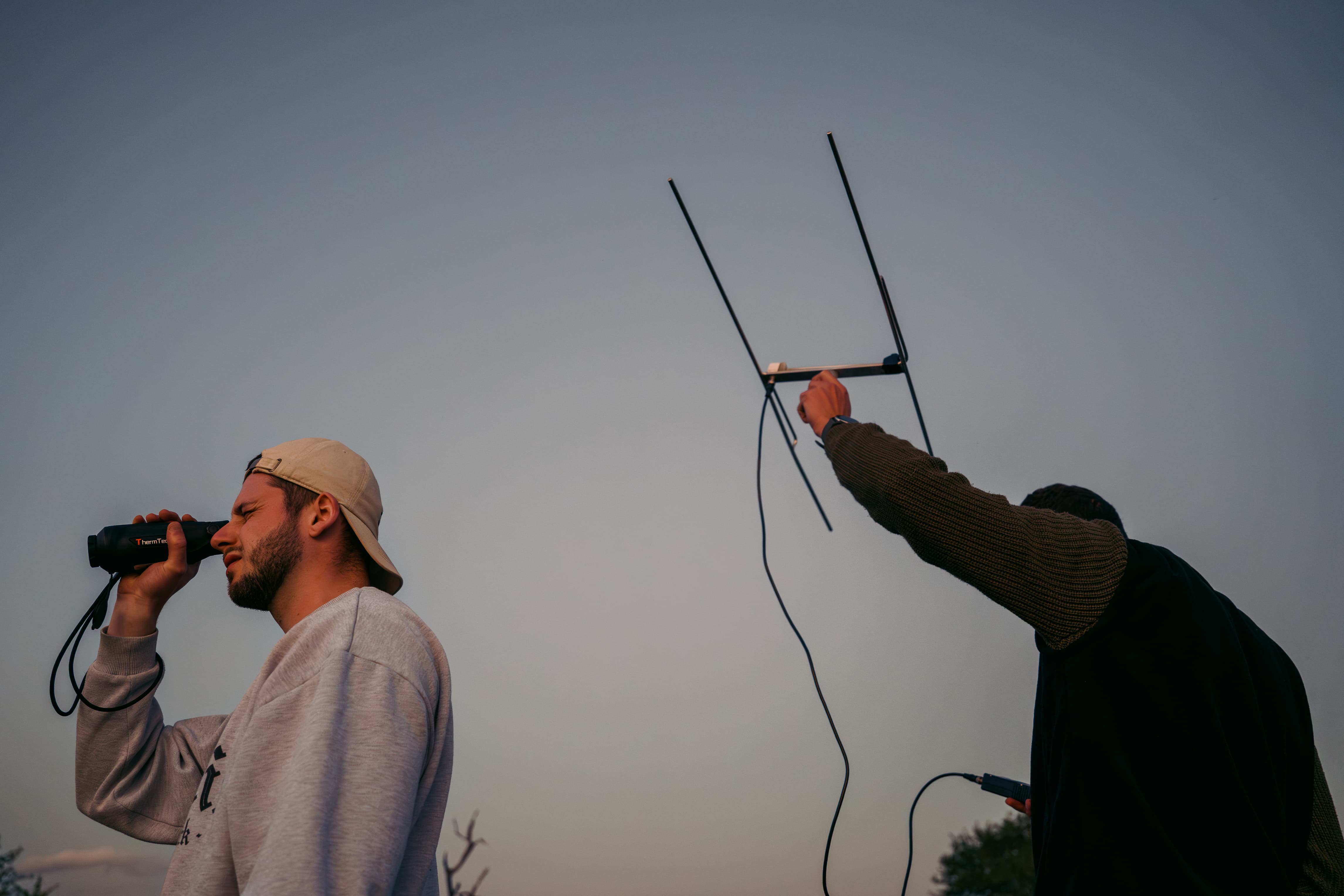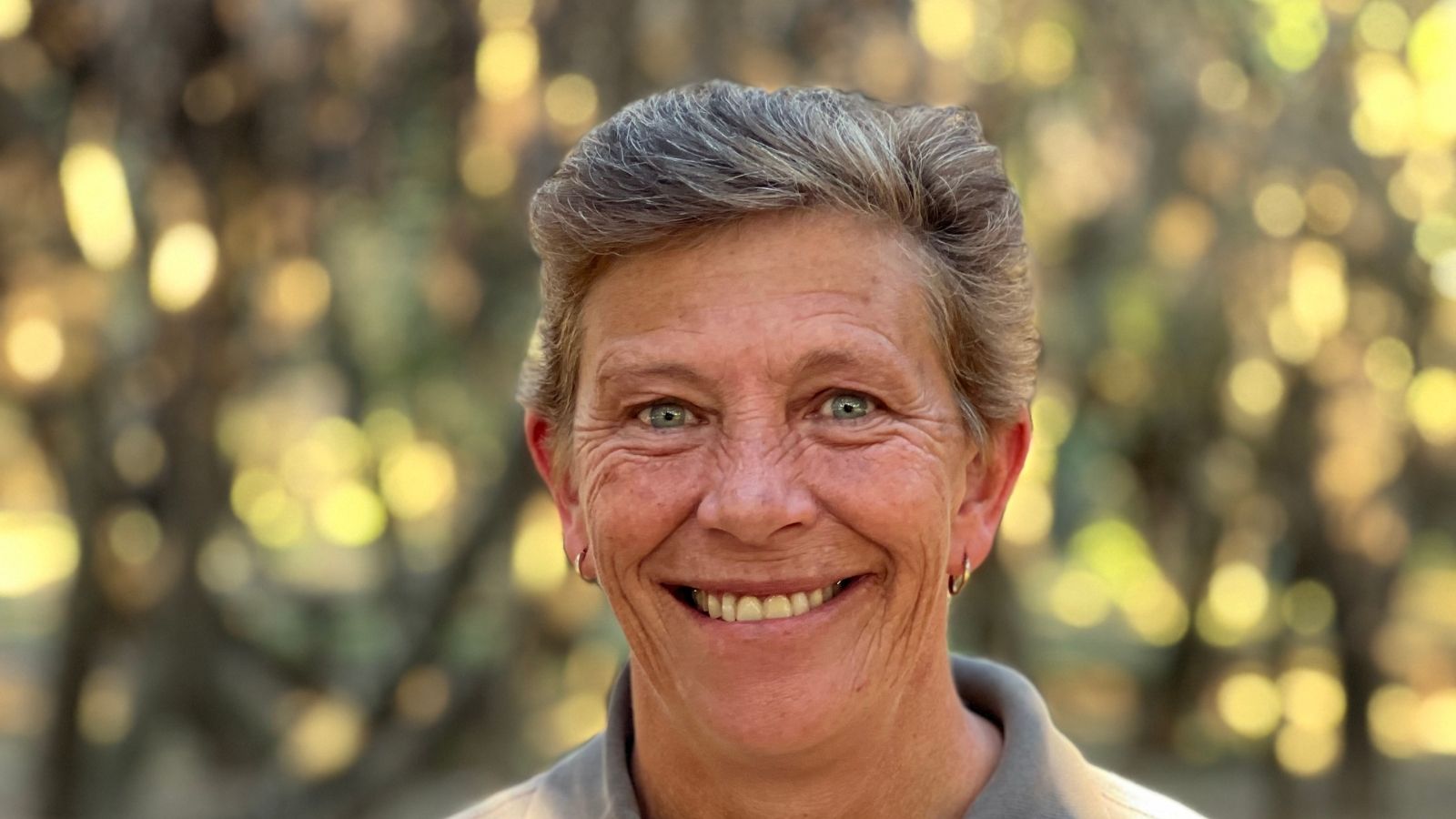Each year on 9 August, South Africa marks National Women’s Day. While our appreciation for the women across Wildlife ACT is never confined to a single day, this occasion provides a meaningful opportunity to pause and reflect on the vital role they play in driving conservation forward.
Across our projects, women are leading endangered species monitoring, strengthening community partnerships, building conservation knowledge, managing complex logistics, and sharing the stories that connect people to nature. Their impact is felt daily through their dedication, professionalism, and deep sense of purpose.
To mark National Women’s Day 2025, we invited women from across our team to share their reflections. Their responses speak openly to the challenges and rewards of working in conservation, and offer insight into what motivates them, what they are most proud of, and what advice they would give to others interested in this work. Their voices offer inspiration not just today, but every day.

Who We Are: Wildlife ACT’s Mission and Impact in Conservation
Wildlife ACT is a registered non-profit organisation based in South Africa. We focus on the long-term conservation of endangered and priority species through science-led monitoring, research, and community collaboration. Our team works closely with protected area management teams to provide professional monitoring services that directly support the conservation of species such as African Wild Dogs, Black Rhinos, Cheetahs, Lions, Elephants, and Vultures.
We also contribute to marine conservation efforts in the Seychelles, where we help protect endangered sea turtles including Green and Hawksbill Turtles.
Wildlife ACT’s work extends beyond the field. Through conservation training, educational outreach, and community-based projects, we aim to build local capacity and encourage long-term coexistence between people and wildlife. Our impact is made possible by a diverse team of passionate individuals who bring together expertise in conservation management, ecological monitoring, education, operations, media, and fundraising.

Sharing Our Stories: Women of Wildlife ACT Reflect on Conservation
We invite you to read the responses from some of the Wildlife ACT team below. Their answers offer insight into the real-life experiences, challenges, and motivations behind choosing a life in conservation.

Was there a specific moment or influence in your life that made you want to protect wildlife or be involved in conservation?
Dani: When I was younger, I spent a lot of time in the bush with my parents. Seeing animals in nature was pure magic and nothing else I had experienced compared. That feeling stayed with me and I knew I wanted to spend my life protecting that magic.
Megan W: Having grown up with a family deeply invested in protecting our wild spaces, this interest was inherent and grew with each trip to the bush and each opportunity to learn. My sister was studying veterinary science when she sadly passed away and knowing that she had always wanted to work with endangered species like Cheetah and African Wild Dogs in her professional life inspired me to do the same. The opportunity to do so almost felt like a nudge in the right direction from her, which was a special feeling.
Roz: Even though I’m not directly in the field, I believe my work plays an important part in conserving wildlife in Zululand. When I came across the opportunity to join Wildlife ACT five years ago, it felt like I had won the lottery. I finally found a job that truly means something to me—and I didn’t think twice about taking it.
Lucy: When I started applying for jobs in other careers after my degree and realised that I wasn't passionate or excited about the prospect of working in those fields. Then I did a masters in conservation and absolutely loved it.

Kayleigh H: I've always been a farm girl, raised in wild places and respecting nature. I then married a farmer and completed a Master's Degree in Ecology and Conservation, and today I write children's books and field guides that focus on our incredible wildlife, wild spaces and endangered species. My children inspired me. When I started homeschooling my three little Wild Kids in 2019, I soon realised that there was hardly any relatable material on our local species, so I decided to create my own and share it with other families. That's where it all began.
Kirsty: It wasn’t one single moment, but a growing awareness of how disconnected many people have become from the natural world. Seeing the damage we cause—whether through indifference, exploitation, or misunderstanding—made me feel a responsibility to do something. I couldn’t ignore how human actions impact our wildlife and wild spaces, and I knew I wanted to be part of the effort to restore that balance.
Kayleigh W: Jane Goodall played a part in sparking my love for nature, but I was mostly drawn in by wildlife documentaries. I never really watched cartoons growing up. If my brother had them on, I would join him, but if I had the remote, I would choose the Food Channel or anything to do with wildlife and conservation, especially Animal Planet.
During my Honours degree, my supervisor, Dr Yolanda Pretorius, shared stories about her time working as a Cheetah monitor. That changed everything for me. I hadn’t realised that a job like that even existed — that someone could spend their days tracking and monitoring Cheetahs. From that point on, I was determined to find a way to be part of the conservation world.
Elsabé: I don’t think there was a single moment. I remember loving all things nature, butterflies and flowers to the ocean and mountains. My family loves telling the story of how I made a scene about my cousin catching small fish in a tidal pool and then frying them up to serve as lunch!
Lexi: As a little girl, I have always loved wildlife and have always wanted to be a ‘protector’ to say. I grew up always going to the bush on family holidays, getting to know icons such as Lawrence Anthony and watching series such as Dr Pol or Yukon Vet.

What part of your work are you most proud of?
Kayleigh W: I’m most proud of the team I lead and the work they do on the ground. I used to be a monitor myself and I miss it deeply, but seeing the dedication and impact of the teams I now help support fills me with pride. It’s not just about managing — it’s about recognising their commitment and knowing the work is being done with care and purpose.
Roz: Working in the Finance Department has shown me that conservation is about more than just being out there with the animals. It takes a strong team behind the scenes to make it all work. By setting up financial systems and helping manage budgets, I support the work of our project managers and help keep the organisation running smoothly. It’s a privilege to be part of something so meaningful, and doing what we all love most - protecting our wildlife.
Elsabé: I am most proud of being able to use my time and energy to serve a purpose that is so much larger than myself. For me, conservation of our planet and all the life around us is the most meaningful cause to serve.
Lexi: The work that I am most proud of is the hands-on approach, as well as teaching others about Conservation and what roles and responsibilities one owes to conservation. To say I have directly contributed to saving endangered species, is a feeling nobody can take away from me. It is also a feeling that not many others can understand, as they have not experienced or fully understand the bigger picture.
Megan W: I am most proud of being able to bridge some of the gap between storytelling and conservation. Marketing, communications and media within this industry is complex and I am proud to do my part in creating trusted resources for both partners and the public. Fundraising for the crucial needs of species like Vultures is also incredibly rewarding.
Kayleigh H: Hands-down the educational material and resources that I have created that are reaching children and communities across KwaZulu-Natal and beyond. I believe that conservation starts with education, planting seeds of inspiration in little minds, so to be a leader in this area is pure magic. When I attend Kids Camps, I leave feeling so incredibly emotional and I know that creating educational material for children is my absolute passion and brings me so much joy.
Dani: Running a Leopard project, which is something quite rare. All the long, dusty, sometimes tough days monitoring priority species are worth it when I know I have played even a small part in protecting endangered wildlife.
Lucy: Helping to contribute to real-world conservation and feeling like I'm making a difference.

What advice would you give to young women or girls interested in wildlife or environmental careers?
Dani: Do not let anyone tell you that you cannot do it, because you absolutely can. You are strong enough, smart enough, and every bit as capable as anyone out there.
Lucy: Don't be afraid to reach out to people/organisations and ask for opportunities. Show enthusiasm and a willingness to learn. The worst people can say is no and sooner or later you will get a "yes". That's how I ended up working in conservation.
Kayleigh H: Don't ever doubt your place in this field. You belong in the meetings, out in the field, in research labs and in communities. Be curious and brave and surround yourself with people who support your journey. Conservation needs your voice, your creativity and your compassion.
Kirsty: Don’t wait to feel ready—just start. There is space for you in this field, and your perspective matters. Speak up, get your hands dirty, ask questions, and know that your presence in conservation is powerful and needed.
Roz: Every role comes with its challenges—none are without them. I believe being a team player is essential (as the saying goes, "there’s no I in team"). It’s also important to adapt to change, even when it’s tough, for your own peace of mind. And most of all, remember that mistakes are just opportunities to learn and grow. Follow your passion, it might be a bit bumpy along the way, but it will pay off in the end!

Share a bit about the women in Wildlife ACT who inspire you:
“It is almost impossible to pick just one. Wildlife ACT consists of so many women who dig deep on a daily basis to do the seemingly never-ending work that comes with being a conservation professional. Everyone from the field, community programmes and head offices are a tremendous source of inspiration.”
“All the female monitors. They are so passionate and work such incredibly long hours and still manage to have a smile at the end of the day while hosting the volunteers. I couldn't do what they do.”
“Anel - despite balancing so much, you never fail to approach everything you do with the utmost kindness and sensibility.”
“Jaxx is someone who inspires me. Her boldness, her energy and her outlook on life make her a truly unique individual, and someone I am proud to call my friend.”
“Zime Khanyile, Wildlife ACT's Hlabisa Community Conservation Liaison, just exudes joy and energy as she goes about her work. I love how she brings her unique style and approach to her work, and gives of her all.”
“Megan Whittington inspires me every day with her unwavering dedication, resilience, kindness, generocity, love and pure grit! She's always the first to step up when something needs to be done and brings so much joy and heart to every project. She just gets it done. I honestly don't know how she juggles so much, never drops the ball all while doing it with so much compassion. It is a daily reminder of how powerful women in conservation truly are!”
“Anel Olivier inspires me to be a better version of myself. She's so passionate and truly believes in the work she does. And she does all of that with a smile on her face.”

“Megan Hudson - I am convinced you have 28 hour days because you get through so much, yet shoulder the responsibilities with grit, grace and determination. Through all this, your empathy never wavers.”
“Dumsile Fakude, known to the team as Dumi, is so knowledgeable and yet so down-to-earth. She recently told me that she is always learning something new when she is in the field. To me, this is indicative of her humility and love of learning. I admire her kindness and warmth, and how that spills over into everything that she does.”
“Kayleigh Huysamen - the words “no” and “impossible” are not in your vocabulary! You are endlessly passionate, energetic, positive and action-focused, doing all you can to help a cause you care so much about.”
“Tegan Goldschmidt is so incredibly dedicated that no matter what is thrown at her, she will push on and give it her absolute all! She shows what true determination means and what following your dreams are all about.”
“Kayleigh Webber has always stood out to me for her quiet strength and unwavering dedication. She balances science, compassion, and leadership so effortlessly, and reminds me daily that leading in conservation doesn’t always require the loudest voice—it often requires the most consistent heart.”
“A Wildlife ACT woman I admire is Nokukhanya Masango, our CCL for Maphambili (Somkhanda). Nokukhanya inspires me because of her deep love for her community, and her passion for connecting it to the work of Wildlife ACT. She takes pride in what she does, working quietly behind the scenes without expecting recognition.”
“Dani - you spend your days dealing with some of the most serious and often heavy subject matter, yet you always have room for a laugh and move forward with such determination. You are a powerhouse!”
“Megan Hudson amazes me with her ability to stay cool, calm, and collected, never drop the ball, and make everything look effortless. Honestly, my whole team inspires me. The dedication and passion they pour into this work is incredible and with Wildlife ACT’s women there is never a shortage of heart.”
“Savannah Reichert, Wildlife ACT's Big Cat Field Technician, is a force to be reckoned with! She is bold yet compassionate, and I so admire her sense of adventure, dedication to the work of Wildlife ACT, and positive disposition.”
“I started with one and then another and then realised that ALL the women working in Wildlife ACT inspire me! I am so incredibly grateful to work for an organisation that celebrates and encourages diversity across the board. All the people on our team are rockstars and inspire me to keep on keeping on.”

Our team’s parting words this Women’s Day:
Dani: Women are powerful, capable, and unstoppable, and when given the chance, they can change the world.
Sandra: Realise that you're allowed to add your take, to voice your opinions, and to take up space. You may be labelled as 'difficult' - but who cares? As Jane Goodall said, 'It actually doesn't take much to be considered a difficult woman. That's why there are so many of us.'
Megan W: To the women interested in playing a part in the conservation industry, there is a place for you here and you are needed.
Kirsty: Women belong in wild spaces. We are caretakers, protectors, scientists, leaders—and the future of conservation is stronger when it includes us all.
Elsabé: Be kind. To yourself. To all the living beings around you.
Lexi: Make the successes big for yourself, as it's something to be proud of, know when to say “I am tired”, and never stop remembering why you took the job in the first place”.

Recognising the Role of Women in Conservation at Wildlife ACT
The women who form part of Wildlife ACT are leaders, mentors, monitors, creators, and change-makers. They work across protected areas and programmes to ensure that conservation is not only effective but also inclusive and forward-thinking.
Their words highlight the realities of conservation work, from long hours and logistical challenges to moments of joy, fulfilment, and connection. These are the voices behind real conservation impact.
At Wildlife ACT, we do not celebrate their efforts on one day alone. We value and rely on their leadership and expertise every day of the year.


.jpg)






.jpeg)
